|
|
|
Sort Order |
|
|
|
Items / Page
|
|
|
|
|
|
|
| Srl | Item |
| 1 |
ID:
157083
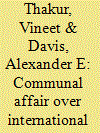

|
|
|
|
|
| Summary/Abstract |
This paper makes an archival journey into the making of institutes of international affairs in late colonial India. By exploring the intertwined lives of two such institutions, it unearths an ideational fight over the study of international affairs in India between the Indian Institute of International Affairs (IIIA), established in 1936, and the Indian Council of World Affairs (ICWA), started in 1943. From the outset, the IIIA was strongly pro-government and saw the ICWA as an institutional rival and a propaganda front for the Indian National Congress (INC). Closer to Independence, the two institutes were increasingly divided along communal and nationalist political lines. The IIIA's leadership became dominated by Muslims and the Muslim League and the ICWA by Brahman Hindus and the INC. As a result, a battle for legitimacy and recognition ensued over participation in international conferences and the ability to publish meaningful research. The ICWA successfully organised the Asian Relations Conference in March 1947, which sealed the fate of the IIIA. It moved to Pakistan in the wake of Partition, then quietly closed down after co-existing briefly with the Pakistan Institute of International Affairs (PIIA).
|
|
|
|
|
|
|
|
|
|
|
|
|
|
|
|
| 2 |
ID:
157085
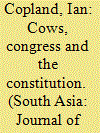

|
|
|
|
|
| Summary/Abstract |
Added late to the draft Indian Constitution, Article 48 specifically mandated the Indian state to criminalise the killing of cows, a provision that, as well as being arguably at odds with at least three of the document's Directive Principles, was implicitly anti-Muslim. The provision was adopted, almost without demur, by a Constituent Assembly dominated by the Congress at a time when discrimination against the Indian Muslim minority in other fields was rife. With hindsight, the making of Article 48 can be seen as the first victory in post-colonial India of the nascent Hindu Right, preceding as it did even the formation of the country's first effective Hindu political party, the Bharatiya Jana Sangh. This paper investigates how, and why, the cause of cow protection came to be supported (and effectively sponsored) in the Assembly by senior members of a supposedly secular Congress parliamentary caucus headed by staunch anti-communalist, agnostic and Muslim sympathiser, Prime Minister Jawaharlal Nehru.
|
|
|
|
|
|
|
|
|
|
|
|
|
|
|
|
| 3 |
ID:
157092
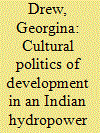

|
|
|
|
|
| Summary/Abstract |
This article examines the cultural politics of hydroelectric development produced by citizens and social movements. Focusing on contentious and competing discourses, it investigates the accusation that activists leading the fight against a series of dams proposed for the Indian Himalayan reaches of the River Ganga were motivated by their self-interested pursuit of name recognition. Through the study of these critiques—which emerged during an ethnographic research project spanning from 2008 to 2009—the article gives insight into an often-overlooked sociological phenomenon: the issue of why more people do not join dam opposition movements in contemporary India.
|
|
|
|
|
|
|
|
|
|
|
|
|
|
|
|
| 4 |
ID:
157095
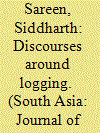

|
|
|
|
|
| Summary/Abstract |
The indigenous Ho people of Jharkhand's West Singhbhum district have long coped with conflict over forests. Despite the importance wood holds for both marginalised and powerful actors, little is known about what determines informal logging locally. This ethnographic study of practices and discourses around logging in a central-eastern Indian forest division examines the views and roles of the actors and institutions involved in wood governance and logging politics. Going beyond tired accounts of state–community conflict and legal–illegal binaries, it addresses how wood extraction is framed locally, and demonstrates how logging is engendered and maintained by a local moral economy.
|
|
|
|
|
|
|
|
|
|
|
|
|
|
|
|
| 5 |
ID:
157093
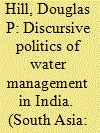

|
|
|
|
|
| Summary/Abstract |
Orthodox approaches to managing Himalayan rivers endorse a singular focus on water as a resource to be harnessed for national security and economic progress, as epitomised by the proposed acceleration of large-scale hydropower construction in the Brahmaputra basin. In reality, existing large-scale hydropower development in the region frequently involves corruption, environmental destruction and forced displacement. This paper argues for an alternative approach to understanding the role of water in India's extractive zones within and beyond the boundaries of the nation, utilising the notions of ‘embeddedness’, ‘hydro-informality’ and ‘rescaling politics’. It is argued that reframing the river in this way can open up space for more just and sustainable practices.
|
|
|
|
|
|
|
|
|
|
|
|
|
|
|
|
| 6 |
ID:
157096
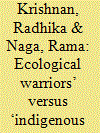

|
|
|
|
|
| Summary/Abstract |
This paper traces the nature of resistance in movements against land acquisition in Jagatsinghpur and Niyamgiri in the state of Odisha in India. At both sites, the movements were united in their opposition to the respective industrial projects, and to the state's notion of ‘development’ premised on resource extraction and large industry. At certain key junctures, the Niyamgiri resistance placed stress on the ‘sacred’ and the spiritual, while the resistance in Jagatsinghpur emphasised ‘traditional’ land- and water-based economic livelihoods. This paper uses these case studies to understand the role of overt and covert ‘performances’ of indigeneity in shaping environmental discourse as well as the state's response to resistance movements.
|
|
|
|
|
|
|
|
|
|
|
|
|
|
|
|
| 7 |
ID:
157088
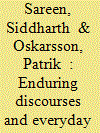

|
|
|
| 8 |
ID:
157089
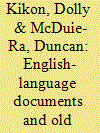

|
|
|
|
|
| Summary/Abstract |
In Nagaland, state attempts to control coal mining are framed as efforts to stop practices labelled ‘unscientific’ by the government. In this article we explore the ways in which communities create their own mining infrastructure built on networks of relations—materialised in English-language documents—and everyday technology—demonstrated in the prevalence of old trucks and improvised machinery. These objects enable livelihoods and supplementary incomes in this region. At the same time, they are also ways of challenging state attempts to control natural resources and for tribal communities to make claims on territory. We focus on coal mining infrastructure, technology and territorial claims in a frontier described variously as remote, inaccessible and underdeveloped, and explore the ways in which practices considered ‘unscientific’ endure and undergird an alternative system of community natural resource management and exploitation.
|
|
|
|
|
|
|
|
|
|
|
|
|
|
|
|
| 9 |
ID:
157084
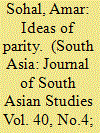

|
|
|
|
|
| Summary/Abstract |
Historians have suggested that the politics of late colonial India centred on a battle between two discrete ideas: Indian and Muslim nationalism. Complicating this binary, this paper focuses on three conceptions of parity between religious groups, contending that this logic transcended Mohammad Ali Jinnah's and the Muslim League's call for constitutional equality between Hindus and Muslims to shape a wider debate about how to defy communal majoritarianism and exit identity politics altogether. Just as Jinnah sought to prevent Hindu dominance within a single state, the Akali Sikhs—influenced as much by a negative historical imagination as the contemporary logic of numbers—produced their own constitutional claim in order to avert Muslim supremacy in the Punjab. Meanwhile Maulana Abul Kalam Azad, president of the Indian National Congress between 1940 and 1946, posited a unique thesis: since modern India was the joint construction of Hindus and Muslims, parity already existed. Though he held that Jinnah's call for constitutional parity was consequently superfluous, Azad's idea of the shared nation led him to search for a genuine consensus, rather than a simple truce, between India's two major political parties. This paper argues that the 1946 Cabinet Mission Plan, offering a degree of parity between communities whilst retaining Indian unity, represented the near-realisation of these three ideas.
|
|
|
|
|
|
|
|
|
|
|
|
|
|
|
|
| 10 |
ID:
157097
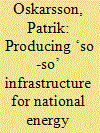

|
|
|
|
|
| Summary/Abstract |
This paper examines transport infrastructure of only middling quality at a Jharkhand coalfield as supporting rather than preventing national energy security. The modest technical efficiency of the infrastructure emerges from a need to align the national provision of energy with a complex political ecology of coal in which various actors seek benefits from its ‘safe’ transport, supply coal to cottage industries and provide alternative livelihoods for the displaced. Unlike in Mitchell's Carbon Democracy, Jharkhand's ‘so-so’ coal infrastructure ensures delivery of coal by being dispersed and flexible, thereby allowing supply by avoiding blockades from influential groups close to the mines.
|
|
|
|
|
|
|
|
|
|
|
|
|
|
|
|
| 11 |
ID:
157090
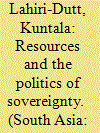

|
|
|
|
|
| Summary/Abstract |
This paper analyses the socio-legal and political spaces within which coal is mined in India and asks if it is possible to raise the ‘moral question’ when the state attributes an iconic status to coal. The empirical evidence comes from two indigenous-dominated states that practise community coal mining. If the coal mining communities in Jharkhand exert a moral claim by mining illegally, those in Meghalaya exert a political claim by invoking the special status the state enjoys under the Indian Constitution. This paper examines this grey zone of non-legality in order to understand resource conflicts and dispossession beyond the straightforward distinctions between legal and illegal.
|
|
|
|
|
|
|
|
|
|
|
|
|
|
|
|
| 12 |
ID:
157086
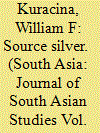

|
|
|
|
|
| Summary/Abstract |
This paper examines Indian socialist ideals that transcended India's Independence in 1947. It introduces a Delhi Police Special Branch confidential informant, ‘Source Silver’, who monitored socialist activities in 1946 and 1947—a peculiar situation in which the conduct of socialist Congressmen was scrutinised by Congressmen in office. The essay also highlights the precise continuity of socialist ideals which originated within the first few years of the Congress Socialist Party's founding and continued after Independence. Likewise, it suggests that these ideals proved ill-suited to the Interim Government period from September 1946 up to the eventual transfer of power in August 1947, a misalignment which prompted Congress socialists to separate from, or have their separation engineered by, the Indian National Congress in early 1948.
|
|
|
|
|
|
|
|
|
|
|
|
|
|
|
|
| 13 |
ID:
157094
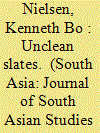

|
|
|
|
|
| Summary/Abstract |
This article interrogates the discourse of ‘greenfield development’ in contemporary India with special reference to the development of a greenfield airport in Goa. By unpacking the conflictual process between carrying out and challenging environmental impact assessments (EIAs) in connection with large-scale infrastructure projects, the article analyses the EIA process as one that simultaneously induces the articulation and territorialisation of the discourse of greenfield development in particular environments, with far-reaching consequences in terms of environmental change and land dispossession.
|
|
|
|
|
|
|
|
|
|
|
|
|
|
|
|
|
|
|
|
|